|
The Role of Repentance in Girls’ Comics
By Briony Coote
With acknowledgements to Jenni Scott for the inspiration and assistance with some of the Jinty stories.
Special thanks to David Roach and Denis Gifford, Encyclopedia of Comic Book Characters, Longman Press, UK, 1987 for assistance with the artistic credits
INTRODUCTION
“Jinty” fan Jenni Scott and I have been lively discussion about certain aspects of girls’ comics. One has been reasons why some serials are short while others are long. We have come to the conclusion that there are more reasons for this than simply whether the story is cut short because it is unpopular, or spun out for as long as possible because it is a smash…
Ahem. Let us get on with another aspect that Jenni and I have been discussing – the role of repentance in girls’ stories. This discussion began when Jenni raised the point of how repentance can turn a story around. She cited the example of a Jinty story, Knight and Day. This was a Cinderella-based story, and its turning point came when the jealous stepsister repented and helped our Cinderella heroine against her uncaring, greedy parents. I certainly agreed that serving as the turning point was perhaps the most obvious role that repentance played. However I felt there was far more to it than that, and I prompted our discussion to take the analysis far deeper.
Our discussion of the role of repentance has now petered out, but I feel there is enough substance now for a serious article on the subject: what does the role of repentance play in girls’ comics?
The role of repentance can be classified under the following headings:
1. Plot structure, development and resolution
2. Character development
3. Redemption and salvation
4. Degree of evil
How are these devices used to utilize the role of repentance to tell a story? For this section we first turn to the most obvious role:
PART ONE: Turning Points
The story is resolved when the main villain or villainess suddenly repents and stops whatever they are doing to cause such grief. However, this depends on how evil they are and what their motives are. If they are hardened or crazed, there can be no repentance short of “shock treatment”, which will be discussed later. The repentance is more likely to occur if they are more stupid or selfish than evil.
In Dirty Trix (Tammy) repenting is even more of a turning point than being caught out at the climax of the story. Trix Harris is cheated of a sports prize and reacts by becomes a cheat herself. Trix turns out to be even more adept at cheating than the girl who originally cheated her. Nonetheless, Miss Wood at the sports centre eventually sees through Trix, and is discussing to what course to take. She is unaware that Trix is eavesdropping...
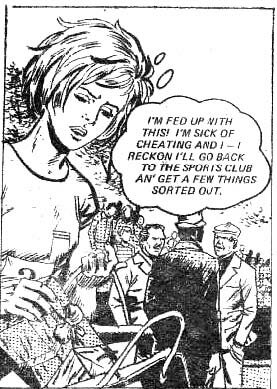 Although she is rumbled, Trix’s cheating has become such a habit that she cannot stop – until something rather bizarre happens. Trix enters a factory team sporting event where she cheats to her heart’s content – and nobody cares! It is an uncouth, unsporting event where everyone seems to be cheating one way or another and the crowd just loves it. Although she is rumbled, Trix’s cheating has become such a habit that she cannot stop – until something rather bizarre happens. Trix enters a factory team sporting event where she cheats to her heart’s content – and nobody cares! It is an uncouth, unsporting event where everyone seems to be cheating one way or another and the crowd just loves it.
All of a sudden, Trix has had enough of cheating and departs to sort things out at the sports centre. The first thing Trix vows to do is apologise to Janet Burton. Janet has resolutely stuck by Trix, but Trix has just used Janet and regarded her as a soft touch, a complete ninny and an absolute nuisance. Now Trix realises what “a little brick” Janet is.
When Trix arrives at the sports centre, she finds she needs to do a lot more than apologise to Janet. Janet has gone after her, but does not realise she is heading for a dangerous demolition area. Trix charges out the door after Janet, praying that she will reach her friend in time…
Trix’s turning point certainly turned out better for her than for Karen Fielding in Friend or Foe? (Bunty). Karen’s parents force her to change schools when she becomes involved with the horrible Maggie gang. At her new school Karen secretly causes trouble for the perfectly nice Hazel crowd just because the Maggie gang hates them.
Karen repents when she realises what a nice bunch of friends they are, and finally understands what a horrible lot her old crowd is. She is very sorry, and sets out for a fresh start with her new crowd, so it all ends happily.
Except for one thing…
When the Maggie gang hears that Karen has reneged they retaliate by exposing her to Hazel’s crowd. They finish with Karen and tell her to clear off with her “horrible friends”. Karen tries to apologise but “it’s no good. They won’t listen to me now. I’ve lost the best friends I ever had.”
It would help if Karen gets a second chance and prove she has changed. However, the point is, Karen had her second chance when she got her fresh start at the beginning of the story. She spoiled it by persisting with her stupidity instead of learning from it and making good with her new crowd.
CRUCIAL TO HAPPY ENDINGS
In some stories repentance is absolutely crucial. It isn’t just because the story cannot be resolved without it, but that the story cannot end happily without it. In both Hettie High and Mighty! (begun in Lindy and completed in the Jinty & Lindy merger) and Day and Knight (begun in Princess and completed in the Tammy & Princess merger), a marriage will be destroyed if the girl does not repent. Being caught out simply will not be enough. If there is no repentance and reconciliation, the marriage is doomed.
Snobby, sneaky Hettie King finds it a tremendous come-down to the run-down Dock End School after attending such a posh academy. This is Dad’s punishment for her:
“It’ll bring you to your senses, Hettie – knock some of them high and mighty ideas out you picked up at that fancy academy”.
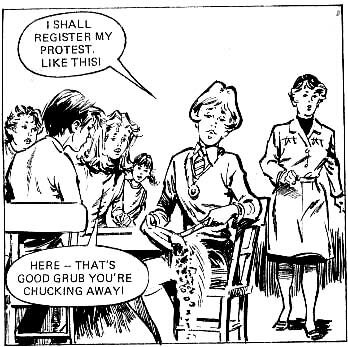 He has miscalculated. Hettie reacts against this by lording it over the girls in the school with her haughtiness, sneaky tricks, bullying and constantly causing trouble – especially for Janie, the captain of the school hockey team. Hettie is a brilliant hockey player who will be a tremendous asset to the team. However Hettie is such a horror that Janie would never have her in the team – except that the school badly needs to win a cash grant from the hockey championship or face closure. So Janie has no choice but to allow Hettie in the team. From there, things just get worse and worse for Janie because of horrible Hettie, who is extremely clever at putting the blame on Janie for her nasty tricks. The nadir comes when their parents decide to marry and Hettie becomes Janie’s stepsister. He has miscalculated. Hettie reacts against this by lording it over the girls in the school with her haughtiness, sneaky tricks, bullying and constantly causing trouble – especially for Janie, the captain of the school hockey team. Hettie is a brilliant hockey player who will be a tremendous asset to the team. However Hettie is such a horror that Janie would never have her in the team – except that the school badly needs to win a cash grant from the hockey championship or face closure. So Janie has no choice but to allow Hettie in the team. From there, things just get worse and worse for Janie because of horrible Hettie, who is extremely clever at putting the blame on Janie for her nasty tricks. The nadir comes when their parents decide to marry and Hettie becomes Janie’s stepsister.
It is vital now for Hettie to change her attitude – not only for herself, Janie, and the team - but for their parents’ sake. Merely catching Hettie out will not be enough because the bad blood between the girls will threaten to tear their parents’ marriage apart. Hettie must repent, and make up for things in a tremendous way. Eventually Hettie is humbled and repents, and redeems herself when she helps her team to victory despite being injured.
 In Day and Knight Carrie Knight bullies Sharon Day, so Sharon is horrified to hear that her father plans to marry Carrie’s mother. Dad does not believe Sharon and like Hettie King, Carrie is extremely clever at pulling the wool over her parents’ eyes. Although Dad knows that there is some sort of problem with the girls, he foolishly insists on going ahead with the marriage. However, if he had hoped that the marriage would solve the problem he is sadly mistaken. Carrie’s bullying drives Sharon out of her own home and she takes refuge with her grandmother. In Day and Knight Carrie Knight bullies Sharon Day, so Sharon is horrified to hear that her father plans to marry Carrie’s mother. Dad does not believe Sharon and like Hettie King, Carrie is extremely clever at pulling the wool over her parents’ eyes. Although Dad knows that there is some sort of problem with the girls, he foolishly insists on going ahead with the marriage. However, if he had hoped that the marriage would solve the problem he is sadly mistaken. Carrie’s bullying drives Sharon out of her own home and she takes refuge with her grandmother.
The following day Dad catches Carrie out when he tracks down Sharon’s guitar, which Carrie had stolen and sold off (her worst trick). Dad decides that if he is to make Sharon happy, he must sacrifice his own happiness for hers. This means ending his marriage with Carrie’s mother – unless…
“Unless you make it up with Sharon – my marriage is over! ... You’d better be more than sorry – I want you to change your ways!”
Carrie certainly changes her ways. She finishes with the bad crowd she has been hanging around with and tries to make peace with Sharon. However, Sharon will have none of it, and the story provides none of the usual opportunities (such as saving her victim’s life) that would help Carrie to convince Sharon. Dad feels the only way to bring Sharon home is to separate from Carrie’s mother.
Then Sharon sees that the heartbreak is destroying her father, and will ultimately destroy their relationship. It is this, and not any proof of Carrie’s remorse, which prompts her towards a grudging reconciliation with Carrie. Carrie jumps at the chance with alacrity: “you won’t regret it! I realise now how much I’ve got to lose!”
In “No Medals for Marie” a boy’s life depends on the villainess’s repentance. Marie Smart is an all-gifted girl who comes out top in everything, so her parents are looking forward to seeing her filling up the sideboard with medals and trophies from her new school. Then Marie visits her eccentric godmother, Miss Simon. Miss Simon wants Marie to inherit her country hall when she reaches a certain age – but on the strict stipulation that she wins no medals in the interim. Miss Simon has never won any medals herself and is twisted with jealousy. Just because she has won no medals, she is determined that her successor should not have any either.
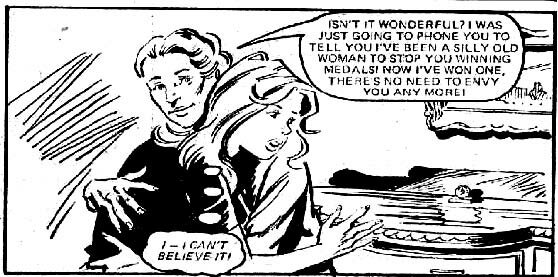 We expect Marie to tell Miss Simon to go shove her crummy hall. Unfortunately, her brother Paul badly needs the country air of Simon Hall. Paul is gravely ill with asthma and will die if the family does not leave their air-polluted town, but they cannot afford it. So for Paul to live at Simon Hall, Marie agrees to win no medals, even though it means disappointing and sometimes even shaming her family. We expect Marie to tell Miss Simon to go shove her crummy hall. Unfortunately, her brother Paul badly needs the country air of Simon Hall. Paul is gravely ill with asthma and will die if the family does not leave their air-polluted town, but they cannot afford it. So for Paul to live at Simon Hall, Marie agrees to win no medals, even though it means disappointing and sometimes even shaming her family.
For a while Marie succeeds in not winning medals, but eventually she cannot help herself. When Miss Simon hears, she refuses to let Marie have the hall. Although Miss Simon understands Paul’s condition, she is prepared to leave him to die a lingering death in the smoky town because of her petty jealousy. Repentance is now a matter of life or death; if Miss Simon does not see reason as quickly as possible, Paul will eventually die.
Marie decides to go and give the “jealous battle-axe” a piece of her mind – only to be completely astonished to see that Miss Simon has won her very first medal! Miss Simon now realises what “a silly old woman” she has been to stop Marie winning medals and allows the family to move in immediately. Paul’s health soon improves and his asthma is disappearing. Miss Simon and Marie now have a race to see who fills up their sideboards with medals first. No medals for guessing who is leading – after all, she has a lot of ground to make up.
We hope for and we may even expect, the villain to repent. But sometimes they take us completely by surprise because we did not expect them to repent. One example is Little Horror! (Mandy). Dianne Moore has fallen for Paul Peters, and she is using his kid brother, Terry, to get him to notice her. The trouble is, Terry is the titular little horror and his mischievous tricks keep getting Dianne into trouble. (I suppose that’s what comes of using kid siblings like that).
Terry’s tricks bring Paul to the verge of telling Dianne to get lost. It is here that Terry suddenly repents. His latest trick went too far, and he has abruptly realised that Dianne has never once told on him. Instead, she always quietly took the blame. Terry is so impressed that for the first time in his life he feels compelled to confess.
Paul responds: “You little monster! But you’ve done well to own up.”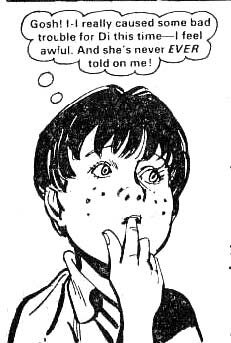
Paul tries to patch things up with Dianne, but she has changed her mind about him. Dianne has just noticed another hunk, but her chanced are reduced after an unfortunate contretemps with a hose. Dianne is wondering if there is a kid brother or sister available that she can use to catch this boy…some people never learn.
Lesser villains and turning points
In some stories it is a lesser villain who repents because he/she is not as evil as the main one, who never repents. It is this repentance that resolves the story. Once the lesser villain repents, he/she helps the heroine against the main villain. The lesser villain may be a “partner in crime” such as the girl mentioned in the Jinty story, Day and Knight. In others the lesser villain and main villain do not even know each other. Their paths may run parallel but do not cross until it is time to resolve the story.
Two cases in point are the Tammy stories Olympia Jones and It’s a Dog’s Life! Funnily enough, both explore the same crime – cruelty to animals.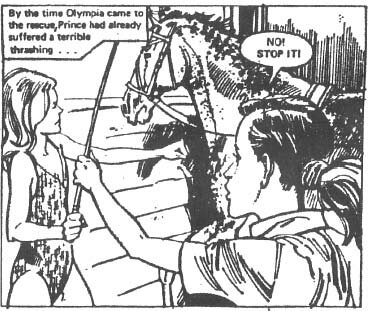
In Olympia Jones (written by Anne Digby) Mr. Rott dismisses Olympia from his circus for cruelty to a circus horse, Prince – but he knows full well that his daughter Linda was responsible. Linda is a spoiled, hard-boiled girl who thinks only of being a circus star. She hates Prince because “the bad-tempered brute” does not perform for her the way he performs for Olympia. Plus, Linda bears a long-standing jealousy towards Olympia because Olympia had always been the crowd favourite in the circus act they used to share together. So Linda started beating Prince, and when Horace Phipps of LOLA (League of Love for Animals) discovers evidence of a ferocious whipping, Mr. Rott covers up for Linda and squirms his way out of prosecution by putting the blame on Olympia. Later Mr. Rott scolds Linda – not for the cruelty but for nearly landing him in “big, big trouble!”
All Linda says is: “I wish you’d never bought that horrible horse, Dad, and that’s a fact. If you knew how he played me up…anyway, I’m off to bed!”
Naturally, Olympia refuses to leave Prince to Linda’s mercy, so she takes him with her and offers her caravan home (a valuable collector’s item) in exchange. The Rotts are only too happy to accept the offer and forget about Olympia and Prince – or so they think…
Meanwhile, Olympia rapidly secures another job as a pony trek rider at Summerless Adventure Centre. Olympia strikes problems with a difficult pupil, the haughty Amanda Fry, who “thinks she knows it all”. Worse, Amanda beats her pony with a riding crop: “the crop doesn’t hurt them. I’ve always used one.” Ironically, Amanda’s father is the President of LOLA.
Unlike Linda, Amanda does listen to Olympia when she tries to change Amanda’s attitude towards her pony: “I-I’m sorry, Miss Jones. I never thought of it like that before.” Amanda makes a genuine effort to change – until the day she loses patience with her pony and reverts to the crop once more. This backfires when her pony bolts and Amanda nearly has a terrible accident. Nothing like a shock to change a bad attitude!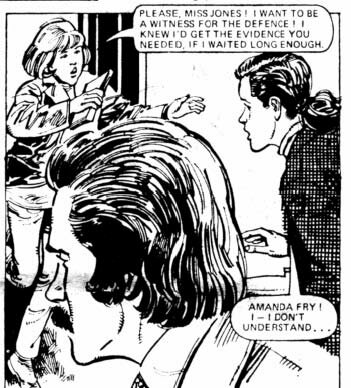
While galloping to Amanda’s rescue, Olympia discovers that Prince is a natural show-jumper. Olympia has dreams of winning an equestrian Olympic gold like her late father. Her dreams seemed dead when her parents died and she was reduced to animal trainer at the circus, but now they are reviving. Before long, Olympia is short-listed for the Olympic team.
But just as Olympia’s place in the team seems secure, the old LOLA trouble returns to haunt. It seems that Mr. Rott overlooked something when he sacked Olympia:
“Takings down again, Linda. Sometimes I regret sacking Olympia Jones. She certainly knew how to train the animals.”
Now it seems their luck could change as they realise that Prince is now worth a fortune as an Olympic prospect. Egged on by the still-jealous Linda, Mr. Rott plots to take Prince back from Olympia and sell him off for a tidy profit. He goes to Mr. Phipps with a concocted story that Olympia stole Prince in revenge for her dismissal. He does not want the police involved but he is fearful of the cruel methods she must be using to turn Prince into an Olympic champion, so could LOLA help them to quietly recover Prince…?
However, Olympia and Prince slip through LOLA’s net, leaving the Rotts with no choice but to call the police and end up with a big court case on their hands instead of making a quick fortune. Olympia is arrested and Prince is returned to the Rotts, who are waiting on a buyer. In the meantime they have to endure “the bad-tempered brute” once more and Linda is not sure she can hold to her father’s orders to keep her temper with him...
When the news breaks, Amanda Fry decides to take a hand. Owing Olympia a favour and knowing she is not capable of such cruelty, Amanda conducts a secret vigil on Rott’s Circus, armed with a camera. So when Mr. Phipps presents his photographs of Olympia’s “cruelty” at the trial, the Defence counters with its own photographs, courtesy of Amanda Fry. These photographs show “all too clearly, Linda Rott ill-treating Prince…”
“HOW DARE YOU SPY ON ME! HOW DARE YOU COME CREEPING AROUND PRIVATE PROPERTY TAKING PHOTOS LAST NIGHT…LET ME HAVE THEM!” Police officers restrain Linda, who goes on screaming: “DON’T LOOK AT THOSE PHOTOS! I NEVER REALLY HURT PRINCE!”
Naturally, Olympia is acquitted and goes on to win the Olympic gold. However, the serial does not record LOLA’s reaction to the new evidence or the ultimate fate of the Rotts. They definitely lose the fortune they wanted to make out of Prince, and the scandal must have wrecked their lives and business. We can safely assume that Linda is prosecuted, but we cannot be sure if her father is as well, or whether it produces any repentance.
So we have the two girls, Linda and Amanda, both of whom are guilty of beating horses. Their cruelty stems from unhealthy attitudes towards animals. In the case of Linda, this is compounded by her hatred of Prince, her spoiled, arrogant ways and her jealousy of Olympia. Plus, Linda has a very bad parental model. Mr. Rott not only spoils Linda, but he is clearly a dishonest, unscrupulous man. He may never have been outright cruel to an animal, but the fact that he berated Linda for nearly getting him into trouble with LOLA and not for the cruelty itself, says a lot about his attitude on the matter.
Amanda, too, has a callous attitude towards her pony, despite her father being President of LOLA. Like Linda, Amanda makes things difficult for Olympia. But unlike Linda, Amanda listens to Olympia and makes an earnest effort to change, even before the shock of the bolting pony reforms her for good. After all, as a riding instructor Olympia has greater authority over Amanda than she did over Linda as a mere animal trainer. Moreover, Amanda may have been haughty, inconsiderate, a know-it-all; but unlike Linda, she had no outright malice towards either Olympia or her mount. She was merely inconsiderate and arrogant, but she not only repented but she paid back her lessons to Olympia in kind.
Now we move on to It’s a Dog’s Life! (written by Alison Christie). Rowan Small is sent to Hope House after she is orphaned. In the home, Rowan finds herself being bullied by Jenny (last name not revealed) because she is indeed small. Rowan is so miserable she wishes she was dead along with her parents. Then she befriends Riley, the mongrel next door, who is receiving brutal ill-treatment from his master, Bert (last name not revealed). Bert and his horrible mother only bother with Riley because Riley’s owner, who is constantly absent, pays them a good sum of money for taking care of him. The money does not stop Bert from constantly kicking and starving the “brat of a dog”. Why? Bert is a thug, plain and simple. It would be no surprise if he was the school bully or grew into a violent criminal.
A friendship ensues between Rowan and Riley. Despite the cruelty he is receiving, Riley still has the pluck to give Rowan a tail way to cheer her up. This goes a long way to making Rowan feel better about her plight. “If he can keep his tail up, so can I!”
Eventually the bullying and cruelty get too much even for Riley’s tail-wagging. Rowan runs away and takes Riley with her. Of course, the police soon find them and bring them back
Rowan is braced for more bullying, but instead she finds herself “the heroine of Hope House” among all the children who admire her for running away. The bullying ceases and Jenny even becomes friends with Rowan.
Meanwhile Bert is as bad as ever and kicking Riley as usual. All of a sudden, Riley’s owner shows up and catches Bert right in the act! Rowan is “so glad” when the man takes Riley away from Bert. Then, she is in floods of tears at the thought that she will never see her friend again.
  It is here that Jenny intervenes and commits her ultimate act of atonement. She stops Riley’s owner and has a word with him. Seconds later, the owner offers Riley to Rowan to keep for good! And to round things off in true happily-ever-after style, Rowan and Riley are soon adopted by a loving couple. It is here that Jenny intervenes and commits her ultimate act of atonement. She stops Riley’s owner and has a word with him. Seconds later, the owner offers Riley to Rowan to keep for good! And to round things off in true happily-ever-after style, Rowan and Riley are soon adopted by a loving couple.
Throughout the story there have been parallels between Jenny’s bullying and Bert’s cruelty. In one episode Jenny sets up two other bullies to gang up on Rowan while Bert recruits two more boys to help him kick Riley. Yet the role of repentance brings in a contrast to the parallels. Jenny becomes a better person and helps ensure the happy ending to the serial. Jenny redeems herself by stopping her bullying, becoming friends with Rowan and then ensuring that Rowan does not lose Riley forever. Bert does not repent, change his behaviour, or redeem himself in any way. Certainly he is discovered and loses the income that he and his mother were receiving from Riley’s owner, but Bert is more likely to go kick some other poor animal than change his ways because of it. Oh, for a sequel where Bert and his mother get a good sharp shock to teach them a lesson – which leads us to the category in Part 2: Shock Treatment
There are five parts to this article, this is Part 1 | Part 2 | Part 3 | Part 4 | Part 5
|